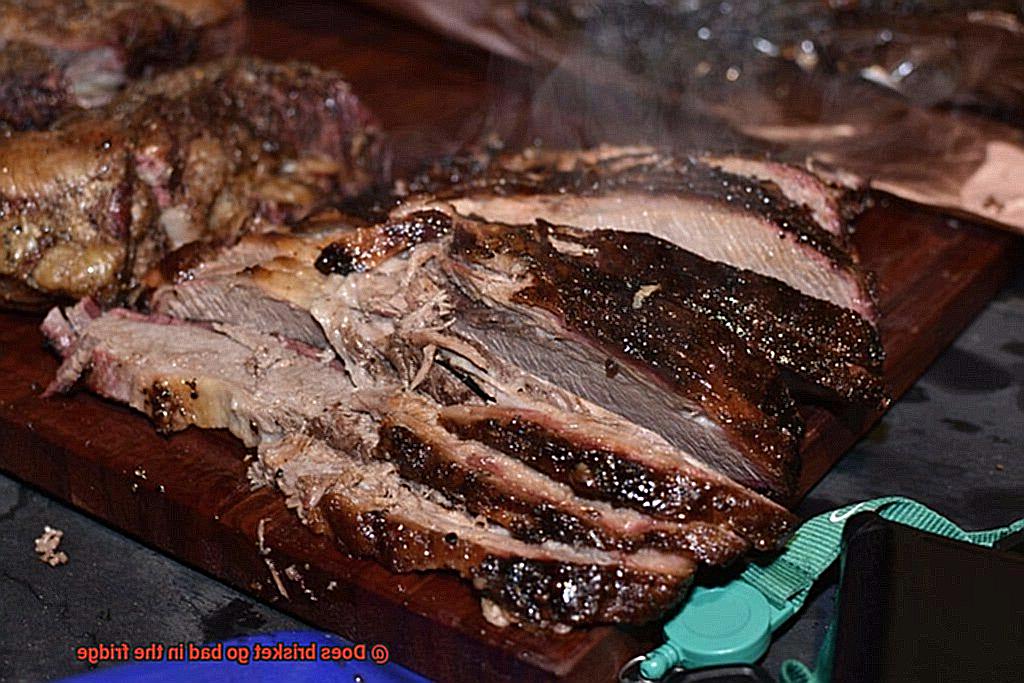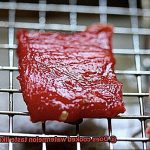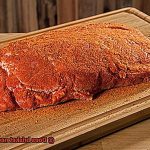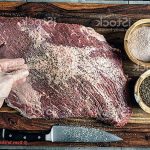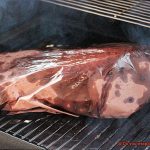Are you a fan of brisket? This cut of meat is a must-have for any meat-lover, and it’s easy to see why. From Texas-style barbecue to braised beef brisket, there are endless ways to enjoy this mouth-watering dish. But what happens when you have leftover brisket in the fridge? Does brisket go bad in the fridge? It’s a question that many people ask themselves, and the answer isn’t always straightforward.
As an expert on the matter, I’ve seen plenty of people struggle with the decision of whether to toss or eat their leftover brisket. There are several factors that contribute to how long brisket lasts in the fridge, including temperature and proper storage. However, one of the most critical factors is undoubtedly the quality of the meat itself.
In this blog post, I’ll provide you with all the necessary information about how to store your brisket properly, how long it can last in the fridge, and how to determine if your leftover meat has gone bad. So let’s dive into this delicious world of brisket together and uncover everything you need to know about keeping it fresh.
Contents
What is Brisket?
Brisket is a flavorful slice of beef that originates from the breast or lower chest area of a cow. It’s known for its tough, fibrous texture, which requires slow cooking to transform it into a tender and mouthwatering meal.
When shopping for brisket, it’s essential to look for a piece with good marbling. This feature not only adds flavor but also keeps the meat moist during the cooking process, resulting in a more delicious end product. Brisket comes in two parts: the point and the flat. The point is the fattier and more flavorful part, while the flat is leaner and easier to slice.
Brisket is a staple in many barbecue restaurants, where it’s cooked for hours using smoke or low heat to break down its tough fibers, creating an irresistible result that melts in your mouth. In Jewish cuisine, brisket is often braised with onions and served as a special holiday meal.
Proper storage is crucial to ensure that your brisket remains fresh and safe to eat. When storing brisket in the fridge, it’s essential to keep it refrigerated at 40°F or below to prevent bacteria growth. It’s also recommended to consume it within 3-4 days of purchase.
However, there are factors that can impact how long your brisket will last in the fridge. For instance, if you vacuum-sealed your brisket or stored it in an airtight container, it can last longer than if it was left exposed to air. It’s worth noting that freezing your brisket can extend its shelf life up to six months without affecting its quality or flavor.
How Long Does Brisket Last in the Fridge?
You know that proper storage is essential to maintaining its freshness and flavor. As an expert on this topic, I’m here to answer the question on everyone’s mind: How long does brisket last in the fridge?
Let’s start by defining brisket. It’s a cut of beef that comes from the lower chest or breast of a cow. Known for its rich flavor, it’s a popular choice for smoking and grilling. However, if you’re planning on storing leftover brisket in the fridge, you need to know how long it will last.
The general rule of thumb is that brisket can last up to four days in the fridge if stored properly. However, several factors can impact its shelf life. Let’s explore them in more detail.
Quality of the Meat:
The quality of your brisket is crucial when it comes to how long it will last in the fridge. High-quality cuts from reputable sources will typically last longer than lower quality ones. Always check the expiration date before cooking and buy fresh brisket.
Cooking Method:
How you cook your brisket can also impact its shelf life. Slow-cooking methods like smoking or braising can help preserve the meat’s moisture and flavor. Conversely, cooking at high temperatures can dry it out and decrease its lifespan.
Storage:
Proper storage is key to maintaining the freshness of your leftover brisket. Be sure to wrap it tightly in plastic wrap or aluminum foil before placing it in the fridge. An airtight container is also an excellent option if you have one available. Leaving it uncovered can cause it to dry out and spoil faster.
When in Doubt, Throw it Out:
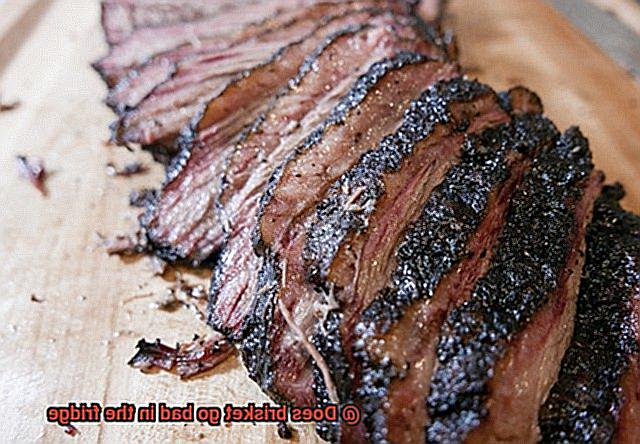
If you’re unsure about whether or not your brisket is still good to eat, don’t take any chances. Consuming spoiled meat can lead to foodborne illnesses like salmonella or E.coli, which can cause serious health problems. Always err on the side of caution and throw it out if you have any doubts.
Factors That Impact Shelf Life of Brisket in the Fridge
As an expert on the matter, I am here to share some tips and tricks that will keep your brisket fresh for as long as possible.
Temperature is key when it comes to preserving the shelf life of brisket in the fridge. The ideal temperature for storing brisket is between 32°F and 36°F. If the temperature is too high, bacteria can grow more rapidly, causing the brisket to spoil more quickly.
This means that you should ensure that your fridge is set to the correct temperature and that it’s functioning properly.
Packaging your brisket correctly is another crucial factor that can impact its shelf life in the fridge. Brisket should be tightly wrapped in plastic wrap or aluminum foil to prevent air from getting in and causing freezer burn. When air gets in, it can cause the meat to dry out and become tough. To provide extra protection, put the wrapped brisket in an airtight container or ziplock bag.
Last but not least, the freshness of the brisket when purchased also affects its shelf life in the fridge. A brisket that’s already close to its expiration date won’t last as long in the fridge as a fresher cut of meat. Before purchasing a brisket, it’s essential to check for any signs of spoilage such as a sour smell or slimy texture.
The Importance of Refrigerator Temperature
Either way, it’s important to understand the significance of maintaining the correct temperature in your refrigerator. As an expert in all things refrigeration, I’m here to share my knowledge on why the temperature of your fridge is so crucial.
Let’s start with the ideal temperature range for your refrigerator – between 35°F and 38°F. Your freezer should be set at 0°F or lower. This specific range is vital in slowing down bacteria growth, keeping your food fresh for longer. So if you’re looking to extend the life of your brisket or any other perishable foods, make sure they’re stored at this temperature range.
Now, how do you ensure that your refrigerator is at the right temperature? The answer is simple – keep a thermometer inside. This will help you monitor the temperature regularly and prevent it from rising above 40°F.
If the temperature rises above this threshold, bacteria can multiply rapidly, leading to spoilage and potential foodborne illnesses – a nightmare for any food lover.
Aside from using a thermometer, there are other ways to maintain a consistent temperature in your fridge. First and foremost, avoid overloading it with too much food at once. Doing so can cause a rise in temperature, which is not good for your food’s preservation. Additionally, ensure that your fridge is always clean and free of spills or spoiled food that can contaminate other items.
Storing and Cooking Brisket Properly
Brisket – the holy grail of BBQ meats. The smoky, tender, and delicious taste of a perfectly cooked brisket is hard to beat. But to achieve that mouth-watering flavor, you need to know how to store and cook it properly. Here are some tips to ensure your brisket stays fresh, flavorful, and safe to eat.
Storing Brisket:
First things first – when storing brisket in the fridge, make sure the temperature is below 40°F. This temperature range slows down bacterial growth and keeps the meat fresh for longer. But that’s not all; you also need to store the brisket in an airtight container or wrap it tightly with plastic wrap or aluminum foil. This prevents air from getting in and drying out the meat, ensuring it stays juicy and delicious.
If you plan on storing brisket for a more extended period, freezing it is your best bet. Before freezing, wrap the brisket tightly in plastic wrap and aluminum foil to prevent freezer burn, which can ruin its texture and flavor. Don’t forget to label the package with the date of freezing so you can keep track of how long it’s been stored.
Cooking Brisket:
Cooking brisket is an art form that requires patience, skill, and attention to detail. It’s essential to cook it thoroughly to ensure all harmful bacteria are killed. The internal temperature of the meat should reach at least 145°F. Use a meat thermometer in the thickest part of the meat to check the temperature.
But here’s a pro tip: after cooking your brisket, don’t slice into it right away. Let it rest for at least ten minutes before slicing it. This allows the juices to redistribute throughout the meat, making it even more tender and flavorful.
Can You Freeze Brisket?
Ah, the juicy, tender brisket that we all crave. But what happens when you have too much brisket on your hands? Can you freeze it? The answer is a resounding yes. Freezing your brisket is an excellent way to extend its shelf life and prevent food wastage. However, there are some crucial guidelines to follow when freezing brisket.
First of all, ensure that your brisket is fully cooked before freezing it. This will guarantee that the meat stays safe to eat and doesn’t spoil while in the freezer. Once your brisket is fully cooked, let it cool down to room temperature before tightly wrapping it in plastic wrap or aluminum foil.
Next, place your wrapped brisket in a freezer-safe container or bag, and remember to label the container with the date of freezing for future reference. Brisket can be frozen for up to three months without losing its quality or flavor.
When you’re ready to thaw your frozen brisket, do so slowly in the refrigerator. Avoid thawing your brisket at room temperature as this can increase the risk of bacteria growth and spoilage. Depending on the size of your brisket, this process can take anywhere from 24-48 hours.
In addition, here are some helpful tips to keep in mind when freezing brisket:
- Freeze individual portions for easy reheating later.
- Remove as much air as possible from the packaging before freezing to prevent freezer burn.
- Consider using a vacuum sealer for added protection against freezer burn.
- If you’re planning to freeze leftover brisket from a big meal, separate it into smaller portions before freezing.
How Long Does Frozen Brisket Last?
Don’t worry, freezing your brisket is a great solution to save it from going to waste. As a seasoned expert on how long frozen brisket lasts, I have some tips to help you store it properly and make it last as long as possible.
First things first, let’s talk about how long frozen brisket can last. The answer is impressive – up to six months or even longer. That’s right, if stored correctly, your brisket can be enjoyed months after it was first cooked. However, there are a few factors that can affect its shelf life.
The quality of the brisket before freezing plays a key role in determining how long it will last. A fresh cut of meat that has been immediately frozen will last longer than meat that was past its prime before being frozen. So make sure your brisket is fresh and in good condition before storing it.
Another important factor is how you package and store your brisket in the freezer. An airtight container or freezer bag is essential to prevent freezer burn and maintain its flavor and texture. Labeling the package with the date is also crucial so you can keep track of how long it’s been frozen.
Now that we’ve covered the basics, let me share with you some tips on how to thaw your frozen brisket safely. Thawing it slowly in the fridge overnight is the best way to ensure it cooks evenly and safely. Avoid thawing at room temperature or in warm water as this can lead to bacterial growth and spoilage.
In summary, here are some key takeaways:
- Frozen brisket can last up to six months or even longer if stored properly
- The quality of the brisket before freezing and the way it’s packaged and stored can impact its shelf life
- Thawing your brisket slowly in the fridge overnight is the best way to ensure it cooks evenly and safely
Tips for Keeping Your Brisket Fresh
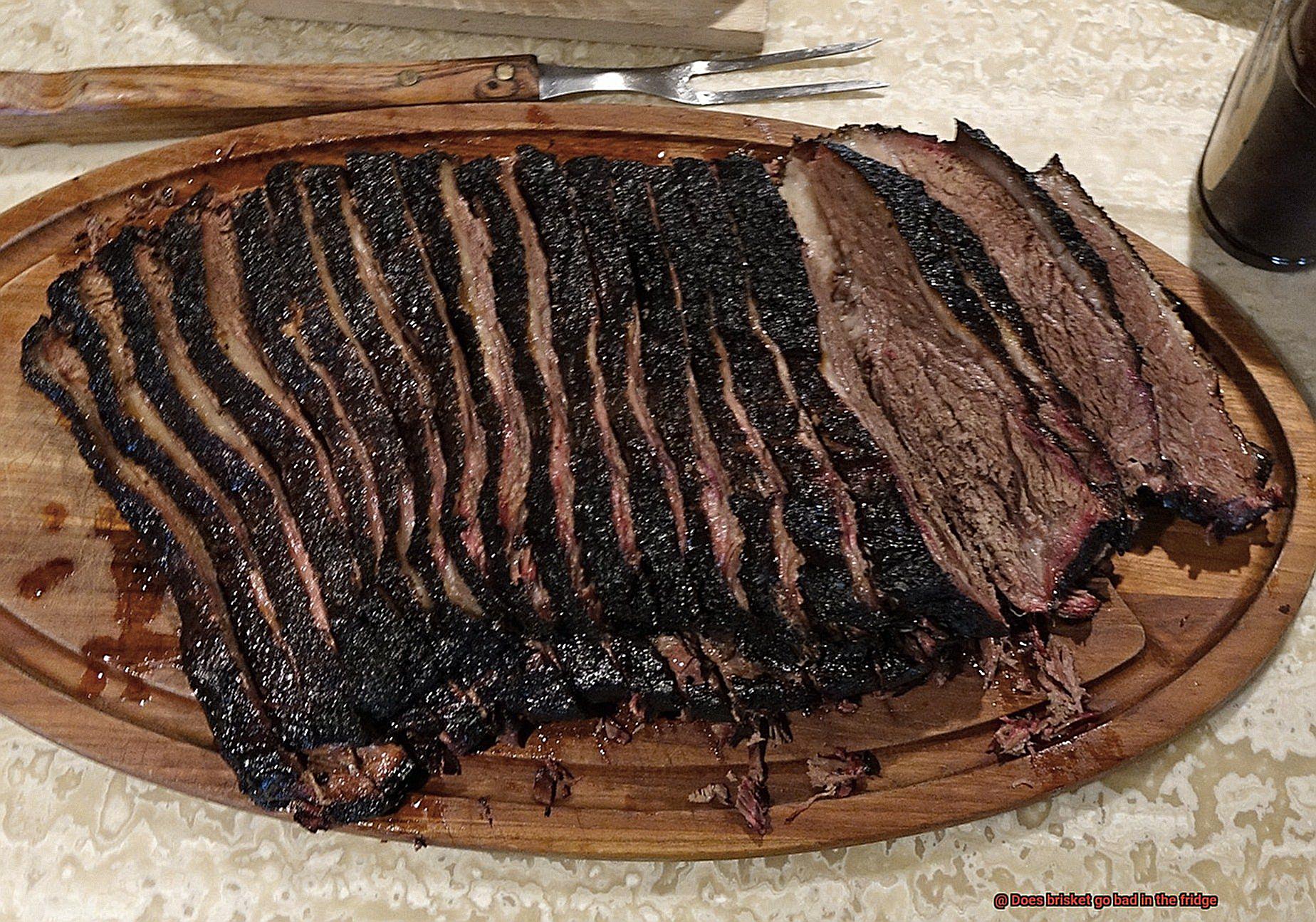
Here are some tips to help you keep your brisket delicious for as long as possible:
Proper Storage
Proper storage is crucial to keeping your brisket fresh. Wrap it tightly in plastic wrap or aluminum foil and place it in an airtight container or resealable bag. This will prevent air from reaching the meat and causing it to spoil.
Temperature Control
To prevent bacterial growth, keep your brisket at a temperature of 40°F or below. Use a thermometer to ensure that your fridge is maintaining a consistent temperature.
Use it Quickly
Brisket typically stays fresh in the fridge for only 3-5 days. It’s best to use it up within this time frame or freeze it if you’re not going to use it right away.
Freezing
If you’re not planning on using your brisket within 3-5 days, consider freezing it instead. Wrap it tightly in plastic wrap and aluminum foil, then place it in an airtight container or resealable bag. When you’re ready to use it, allow it to thaw in the fridge overnight.
Leftovers
If you have leftover cooked brisket, make sure to store it properly in the fridge within two hours of cooking. Wrap it tightly and consume within 3-4 days or freeze for future use.
Proper handling and storage techniques are key when it comes to keeping any type of meat fresh and safe to eat. By following these tips, you can ensure that your brisket stays fresh in the fridge for as long as possible, allowing you to enjoy its delicious flavor and texture at your leisure without worrying about spoilage.
fXe1YUQ3SN0″ >
Conclusion
In summary, brisket is an irresistible and succulent beef cut that can be savored in various ways. However, when it comes to storing leftover brisket in the fridge, meticulous handling and storage are essential for preserving its freshness and safety. As a seasoned expert on the topic, I have shared several tips and hacks to help you extend your brisket’s shelf life.
To maintain the optimal shelf life of your brisket in the fridge, temperature control is paramount. The ideal temperature range should be between 32°F and 36°F. Proper packaging of your brisket is also crucial as it prevents air from seeping in. Tightly wrapping your brisket with plastic wrap or aluminum foil is recommended.
The quality of your brisket significantly impacts how long it will last in the fridge. High-quality cuts from reputable sources tend to last longer than lower quality ones. Additionally, cooking methods such as slow-cooking can help preserve the meat’s moisture and flavor.
If you don’t plan on consuming your leftover brisket within 3-5 days, freezing it is an excellent option. Correctly wrapping your brisket before freezing it can prevent freezer burn while maintaining its texture and flavor for up to six months.
By following these proper storage and handling techniques, you can enjoy delectable brisket dishes without worrying about spoilage or foodborne illnesses.

